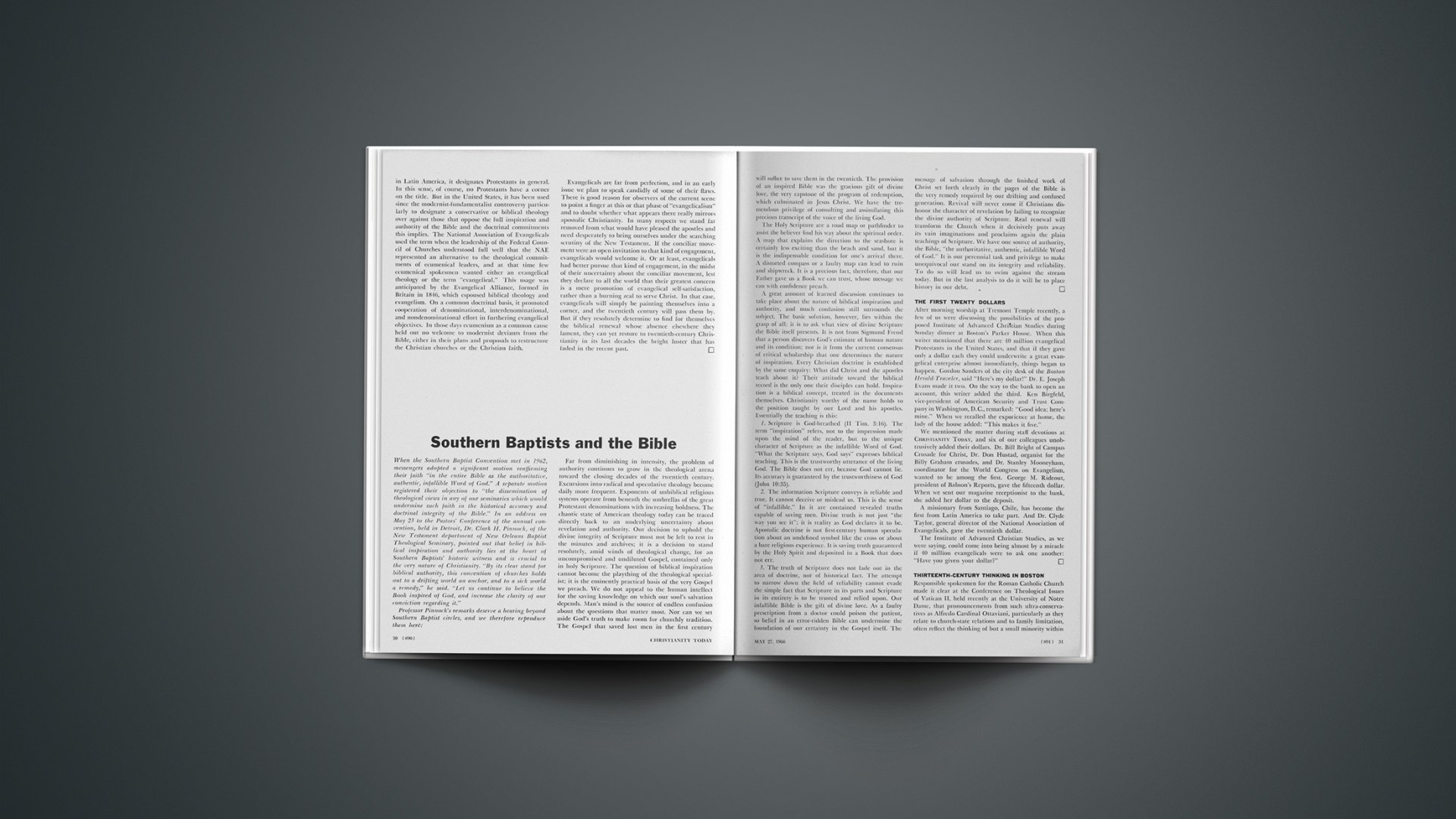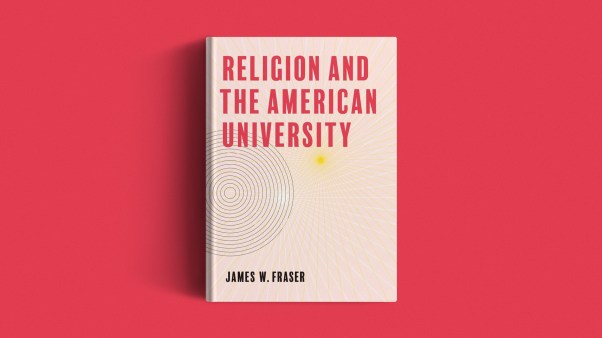When the Southern Baptist Convention met in 1962, messengers adopted a significant motion reaffirming their faith “in the entire Bible as the authoritative, authentic, infallible Word of God.” A separate motion registered their objection to “the dissemination of theological views in any of our seminaries which would undermine such faith in the historical accuracy and doctrinal integrity of the Bible.” In an address on May 23 to the Pastors’ Conference of the annual convention, held in Detroit, Dr. Clark H. Pinnock, of the New Testament department of New Orleans Baptist Theological Seminary, pointed out that belief in biblical inspiration and authority lies at the heart of Southern Baptists’ historic witness and is crucial to the very nature of Christianity. “By its clear stand for biblical authority, this convention of churches holds out to a drifting world an anchor, and to a sick world a remedy,” he said. “Let us continue to believe the Book inspired of God, and increase the clarity of our conviction regarding it.”
Professor Pinnock’s remarks deserve a hearing beyond Southern Baptist circles, and we therefore reproduce them here:
Far from diminishing in intensity, the problem of authority continues to grow in the theological arena toward the closing decades of the twentieth century. Excursions into radical and speculative theology become daily more frequent. Exponents of unbiblical religious systems operate from beneath the umbrellas of the great Protestant denominations with increasing boldness. The chaotic state of American theology today can be traced directly back to an underlying uncertainty about revelation and authority. Our decision to uphold the divine integrity of Scripture must not be left to rest in the minutes and archives; it is a decision to stand resolutely, amid winds of theological change, for an uncompromised and undiluted Gospel, contained only in holy Scripture. The question of biblical inspiration cannot become the plaything of the theological specialist; it is the eminently practical basis of the very Gospel we preach. We do not appeal to the human intellect for the saving knowledge on which our soul’s salvation depends. Man’s mind is the source of endless confusion about the questions that matter most. Nor can we set aside God’s truth to make room for churchly tradition. The Gospel that saved lost men in the first century will suffice to save them in the twentieth. The provision of an inspired Bible was the gracious gift of divine love, the very capstone of the program of redemption, which culminated in Jesus Christ. We have the tremendous privilege of consulting and assimilating this precious transcript of the voice of the living God.
The Holy Scripture are a road map or pathfinder to assist the believer find his way about the spiritual order. A map that explains the direction to the seashore is certainly less exciting than the beach and sand, but it is the indispensable condition for one’s arrival there. A distorted compass or a faulty map can lead to ruin and shipwreck. It is a precious fact, therefore, that our Father gave us a Book we can trust, whose message we can with confidence preach.
A great amount of learned discussion continues to take place about the nature of biblical inspiration and authority, and much confusion still surrounds the subject. The basic solution, however, lies within the grasp of all; it is to ask what view of divine Scripture the Bible itself presents. It is not from Sigmund Freud that a person discovers God’s estimate of human nature and its condition; nor is it from the current consensus of critical scholarship that one determines the nature of inspiration. Every Christian doctrine is established by the same enquiry: What did Christ and the apostles teach about it? Their attitude toward the biblical record is the only one their disciples can hold. Inspiration is a biblical concept, treated in the documents themselves. Christianity worthy of the name holds to the position taught by our Lord and his apostles. Essentially the teaching is this:
1. Scripture is God-breathed (2 Tim. 3:16). The term “inspiration” refers, not to the impression made upon the mind of the reader, but to the unique character of Scripture as the infallible Word of God. “What the Scripture says, God says” expresses biblical teaching. This is the trustworthy utterance of the living God. The Bible does not err, because God cannot lie. Its accuracy is guaranteed by the trustworthiness of God (John 10:35).
2. The information Scripture conveys is reliable and true. It cannot deceive or mislead us. This is the sense of “infallible.” In it are contained revealed truths capable of saving men. Divine truth is not just “the way you see it”; it is reality as God declares it to be. Apostolic doctrine is not first-century human speculation about an undefined symbol like the cross or about a bare religious experience. It is saving truth guaranteed by the Holy Spirit and deposited in a Book that does not err.
3. The truth of Scripture does not facie out in the area of doctrine, nor of historical fact. The attempt to narrow down the field of reliability cannot evade the simple fact that Scripture in its parts and Scripture in its entirety is to be trusted and relied upon. Our infallible Bible is the gift of divine love. As a faulty prescription from a doctor could poison the patient, so belief in an error-ridden Bible can undermine the foundation of our certainty in the Gospel itself. The message of salvation through the finished work of Christ set forth clearly in the pages of the Bible is the very remedy required by our drifting and confused generation. Revival will never come if Christians dishonor the character of revelation by failing to recognize the divine authority of Scripture. Real renewal will transform the Church when it decisively puts away its vain imaginations and proclaims again the plain teachings of Scripture. We have one source of authority, the Bible, “the authoritative, authentic, infallible Word of God.” It is our perennial task and privilege to make unequivocal our stand on its integrity and reliability. To do so will lead us to swim against the stream today. But in the last analysis to do it will be to place history in our debt.
The First Twenty Dollars
After morning worship at Tremont Temple recently, a few of us were discussing the possibilities of the proposed Institute of Advanced Christian Studies during Sunday dinner at Boston’s Parker House. When this writer mentioned that there are 40 million evangelical Protestants in the United States, and that if they gave only a dollar each they could underwrite a great evangelical enterprise almost immediately, things began to happen. Gordon Sanders of the city desk of the Boston Herald-Traveler, said “Here’s my dollar!” Dr. E. Joseph Evans made it two. On the way to the bank to open an account, this writer added the third. Ken Birgfeld, vice-president of American Security and Trust Company in Washington, D.C., remarked: “Good idea; here’s mine.” When we recalled the experience at home, the lady of the house added: “This makes it five.”
We mentioned the matter during staff devotions at CHRISTIANITY TODAY, and six of our colleagues unobtrusively added their dollars. Dr. Bill Bright of Campus Crusade for Christ, Dr. Don Hustad, organist for the Billy Graham crusades, and Dr. Stanley Mooneyham, coordinator for the World Congress on Evangelism, wanted to be among the first. George M. Rideout, president of Babson’s Reports, gave the fifteenth dollar. When we sent our magazine receptionist to the bank, she added her dollar to the deposit.
A missionary from Santiago, Chile, has become the first from Latin America to take part. And Dr. Clyde Taylor, general director of the National Association of Evangelicals, gave the twentieth dollar.
The Institute of Advanced Christian Studies, as we were saying, could come into being almost by a miracle if 40 million evangelicals were to ask one another: “Have you given your dollar?”
Thirteenth-Century Thinking In Boston
Responsible spokesmen for the Roman Catholic Church made it clear at the Conference on Theological Issues of Vatican II, held recently at the University of Notre Dame, that pronouncements from such ultra-conservatives as Alfredo Cardinal Ottaviani, particularly as they relate to church-state relations and to family limitation, often reflect the thinking of but a small minority within the church. Therefore, it came as somewhat of a surprise to lead in the Boston Globe for April 21 that State Representative Charles Ianello of the Roxbury district of Boston urged the Massachusetts Commonwealth Assembly to postpone a vote on the amendment liberalizing the 1879 law on birth control until “the House gets a green light or a red light from Rome.” Happily, the legislative body rejected his plea. One cannot but marvel at a legislator who openly calls for this thirteenth-century procedure in matters of public policy in our pluralistic society.
Representative Ianello commented further that in his opposition he had in mind the protection of unmarried women, adding that married women “can take care of themselves.” This has a strangely odd sound, coming from Roxbury, where, if social workers may be believed, the percentage of chain-pregnancy, child-a-year married couples is higher than in any comparable place in the nation. It would be instructive for the public to know what Mr. Ianello regards to be the proper steps by which married women in his constituency “take care of themselves.”
Cardinal Cushing, universally respected for his enlightened concern in social issues, might well take this opportunity to press for aggiornamento with the representative from Roxbury.
Bishop Pike Steps Down
Many people will breathe more easily now that Bishop Pike has resigned as Episcopal-Bishop of California, though they will be saddened that things have come to this pass (see News, p. 49). While resignations can be refused, there reportedly is “no doubt whatever” that the House of Bishops will accept this one, effective July 15. Probably many of Pike’s fellow bishops will sigh with relief as he leaves for a secular post in Santa Barbara.
Dr. Pike has not renounced his clerical orders, nor has his church unfrocked him. He remains a bishop but without a charge. Yet it is clear that the bishop’s recent theological meanderings do not represent Episcopal conviction. And the use of his name in connection with the so-called Blake-Pike plan has been an embarrassment to ecumenists.
We predict for Bishop Pike a diminishing theological influence once he leaves his diocesan post, though he will then be free to publish wider-ranging and more radical pronouncements than have come from him so far.
However the change of leadership in the Diocese of California originated, the Episcopal Church has suffered no great loss. Indeed, its image is bound to improve as a consequence.
A Turning Point
All Christians are obligated to take seriously their responsibilities as citizens. Thus the recent primary elections in Alabama are of more than political interest. It is a heartening sign that for the first time since Reconstruction many thousands of Negroes voted, and that they did so, as Attorney General Nicholas Katzenbach said, “freely and comfortably.” The exercise of the franchise is no prescription for a perfect society, which, because of man’s fallen nature, will not exist this side of heaven. Yet voting is an essential ingredient of democracy, and its absence threatens the system and leads to the decline of a people.
What happened on May 3 will be remembered as a turning point in the exercise of voting rights by all Americans. May the Alabama primaries stand as a hopeful prophecy for the well-being of our democracy.
Honesty And The Offering Plate
From time to time we hear of shocking accounting procedures in churches. Often a speaker is invited to come to a church to tell of the work of his organization or to show a film, and usually the people are led to believe that what they give in the offering plates will go to the organization whose work has been presented. But this does not always happen.
We learned recently of a deserving group whose representative spoke to some two hundred people in an evening service. Having experienced some odd accounting in other churches, he put twenty-five dollars in small bills in the offering plate as an experiment. When he received the honorarium for his organization, he found it to be twenty-two dollars. What happened to the rest of the offering he never learned.
If this were an isolated instance, one might assume that there was a reasonable explanation. But such things happen too frequently, and too many good people have suffered in silence from dishonesty in the house of God. If an offering is taken for a cause, all of it should go to that cause. To hold back any of the money is stealing, whether it is done by a church or by a robber in a street.
Salute To Integrity
When Pepperdine College of Los Angeles with one mind turned down $1,000,000 rather than compromise its integrity, it rightfully gained wide attention and respect. We salute Pepperdine College for refusing to comply with the condition of the will of the manufacturer of Dr. Ross cat and dog food that broadcaster Dan Smoot be given an honorary doctor’s degree within six months.
It is more difficult than most of us know to say nay to $1,000,000. That Pepperdine is an independent Christian college dependent on gifts for its financing did not make the decision easier. The school needs money, but it did the right thing. Not only an honorary degree but also Pepperdine’s own honor was at stake. Its action will doubtless prompt other benefactors to give Pepperdine some added thought when making bequests.
Pepperdine acted on principle and presented a shining example of the “old morality.” One wonders what the outcome would have been, had the issue been decided on the basis of that “new morality” which rejects all moral principles.










